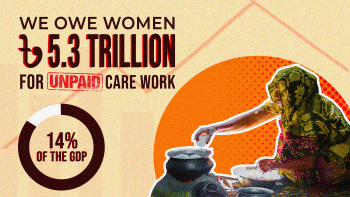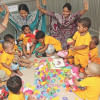Bangladesh needs a comprehensive care system

Salma*, a young garment worker moved to Dhaka from Comilla along with her partner four years ago and they have an eight-month-old son now. They both found work in the same factory. The factory provided maternity leave and benefits during the birth of their child, and Salma returned to work after two months' leave. She initially put her son in the daycare facility in the factory. With two breastfeeding breaks during work, Salma was able to ensure her child was exclusively breastfed for six months. While the daycare facility was free of charge, commuting with a young child was challenging. She recently opted for home-based childcare in her neighbourhood, leaving her son in the care of a woman until they return home from work. This service alone costs them Tk 4,000 per month, a significant portion of the family's expenses given their combined monthly household income is Tk 35,000.
Shafiq* is a sales manager at a pharmaceutical company, and lives in Dhaka with his family, including his aged mother who needs support with her daily activities. Although his wife, Shefa*, is an accounting graduate from the University of Dhaka, both Shafiq and Shefa decided that Shefa would leave her bank job to take care of Shafiq's mother. Shefa hopes to return to her job someday. However, taking care of Shafiq's mother remains a priority for the family at present.
Rahmat* and Rehana* migrated from Mymensingh in search of work, and now live in Dhaka with their three daughters aged eight, six and two years. Rehana is a domestic worker, while Rahmat is a rickshaw puller. Rehana's eldest daughter is yet to start school, as she must look after her two younger siblings, while her parents work. While Rahmat and Rehana would like to send their daughters to school someday soon, they are currently unable to find an arrangement to look after the youngest, so all three girls stay home.
These are some stories of working Bangladeshi families highlighting challenges related to the absence of a comprehensive care system.
With the changes in the nature of work, migration, inflation and climate change, the care arrangements of the past that heavily relied on families are no longer appropriate for today's world of work.
While Bangladesh continues to promote women's economic participation, traditional approaches to care hinging on women as the primary caregivers in families remain prevalent. This limits women's opportunities to get the education and skills required to establish their own businesses or enter and remain in the workforce and contribute to the national economy. The country's women's participation rate in the labour force is low at 21.25 percent.
While new care solutions are being introduced by communities and entrepreneurs, their cost render them inaccessible to most families. The current care system needs to be reformed to ensure better supply, assured quality, accessibility and affordability for all.
The government provides some child, elderly and disability care services but their reach is limited. For example, the Ministry of Women and Children Affairs is currently running some 63 publicly funded childcare centres across the country. Further, the Bangladesh Labour Act 2006 makes legal provisions for employers to ensure workplaces have childcare facilities, either on-site or off-site.
A comprehensive care system would bring together people, institutions, and resources, both public and private, to deliver childcare, elderly care, healthcare, employment injury and rehabilitation support, and assistance for persons with disabilities and special needs.
Professionalisation of care work is essential for providing quality services. Currently, most care occupations and workers are not recognised in law as workers. This maintains informality, produces poor working conditions and provides limited opportunities for skills development and career advancement.
Standardisation of care work and organising the care workforce to ensure that their voices are heard and incorporated when designing decent and dignified working conditions in care occupations is needed.
Going forward, the government, the private sector and workers need to establish together a roadmap for change so that the current care burden on women can be reduced through the development of a care system that can serve the needs of a growing economy and social protection for all in Bangladesh.
* Not their real names
Tuomo Poutiainen is country director of International Labour Organization in Bangladesh.
Views expressed in this article are the author's own.
Follow The Daily Star Opinion on Facebook for the latest opinions, commentaries and analyses by experts and professionals. To contribute your article or letter to The Daily Star Opinion, see our guidelines for submission.

 For all latest news, follow The Daily Star's Google News channel.
For all latest news, follow The Daily Star's Google News channel. 










Comments